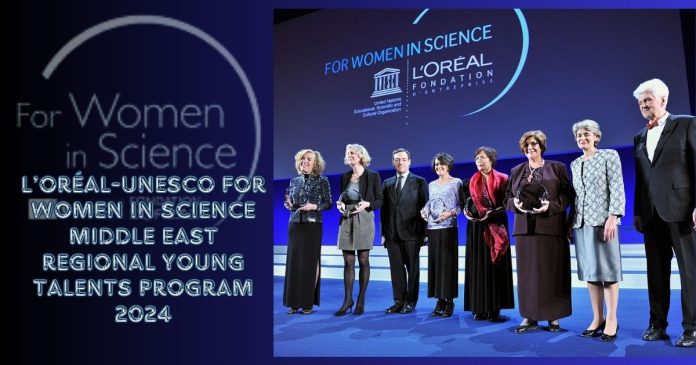L’Oréal-UNESCO For Women in Science Middle East Regional Young Talents Program
The L’Oréal-UNESCO For Women in Science Middle East Regional Young Talents programme is designed to encourage the involvement of youthful women in science in Yemen and the GCC Countries, which include UAE, KSA, Qatar, Bahrain, Kuwait, and Oman. This program aims to detect and award young female talents scientists whose key disciplines are Life Sciences, among others, biology, biochemistry, biophysics, genetics, physiology, neurosciences, biotechnologies, ecology, and ethology or Physical Sciences, among others, physics, chemistry, petroleum engineering, mathematics, engineering sciences, information sciences, Earth and Universe sciences. The Program rewards six young Arab women of talent with their research works and is diligent in pursuing a magnificent career in science in Yemen and GCC countries.
Postdoctoral Researchers:
Applicants must meet the following general criteria:
- Hold a PhD in one of the science fields mentioned in paragraph 1.
- Be a national of an Arab country.
- Be employed in a Research, Laboratory, Institute, or University in one of the countries mentioned in paragraph 1.
- Candidates must be no older than 45 years (Born in 1979 and beyond, considering the year of birth).
PhD Students:
Applicants must meet the following general criteria:
- Hold a Bachelor (B.Sc.) and a Master (M.Sc.) degrees, or equivalent, in one of the science fields mentioned in paragraph 1.
- Be a full-time student in a PhD program and registered during 2023-2024 in the 2nd year of the PhD program, or one year before the thesis defense.
- Be a national of an Arab country.
- Be employed in a Research Laboratory, Institute, or University in one of the countries mentioned in paragraph 1.
- Candidates must be no older than 35 years (born in 1989 and beyond, considering the year of birth).
Selection Criteria.
The jury will consider:
- Outstanding Academic Record: The quality of the candidate’s academic record, including publications, patents, and presentations at scientific conferences, etc .
- The scientific quality of the research performed: the academic jury will evaluate proposed research project on the basis of these criteria too .
- Ethical considerations: candidates must strictly comply with the above-mentioned ethical code at all stages of the scientific activity ;
- Innovation: candidates for the Research Award must provide the jury with description of their project and its outcomes or applications: all information must be original, and the scientific project must be relevant ;
- Communication skills: candidates to the Award must be able to communicate, and, more importantly, to attract the attention of younger members of the science community: mainly, the project funded through the grant in question should support aspiring Arab female scientists ;
- Career intentions of the candidate: if a successful scholar knows what to expect from further career, the award is more likely to benefit the international scientific community ;
- A completed application: detailed description of the project and its methodology must be provided in the application document ;
- Consideration of animal testing: representatives of the ISMR, including scholars, must provide an assessment of research based on the consideration regarding animal testing and justification of possible use.
Guidelines Regarding Animal Testing
- Rejection of Any Suffering Project: Any project involving experimental protocols that may cause animals to suffer will be rejected, even if approved by an ad hoc ethics committee.
- Animal Experimentation Introduced: If animal experimentation is an integral part of the applicant’s research, it must be described in detail. Justification for reasons such as the absence of acceptable alternatives must be provided, and the jury may evaluate or seek clarification on this aspect.
- Ethical Avoidance of Animals’ Suffering: Applicants must publicly commit to avoiding animal suffering during the project to be eligible for grants. This commitment will be included in the application forms and officially announced.
- Non-Laboratory Funding Replacement: Grants are intended for scientific research purposes and should not serve as a substitute for laboratory funding commitments to researchers.
- Non-Renewability of Grants: Grants cannot be renewed under any circumstances. However, they may be combined with other research grants.
Timeline for the Grant Program:
- Application Opening: 8th of January 2024
- Application Deadline: 8th of April 2024
- Review by Jury Members: 15th of April 2024 until 15th of June 2024
- Selection and Winner Announcement: July 2024
- Awards Ceremony: October 2024 (Exact date to be announced)

